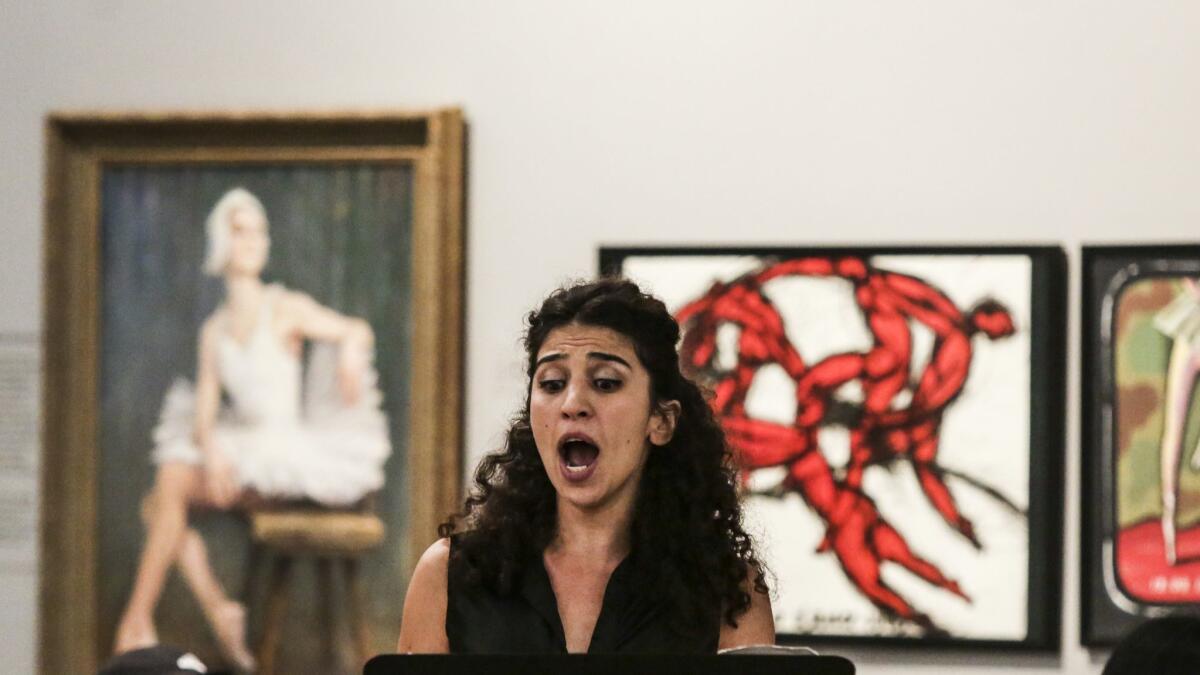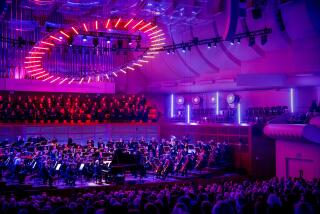Review: Hot sounds for a new museum of the Cold War

The Cold War was a source for scalding new music, with a generation of experimental composers reacting to the political climate of their time and the memory of the devastating war they, as young artists, had just endured. For them, old cultural traditions had become an excuse for deadly jingoism and could no longer be trusted, let alone worshiped.
The place to consider the profound ramifications of the nearly half century from the end of World War II to the demise of the Soviet Union happens to be the fascinating new Wende Museum of the Cold War in Culver City. And now against a backdrop of Eastern Bloc art and artifacts as well as such Atomic Age relics as a huggable (!) mushroom cloud pillow intended to artificially put schoolchildren at ease, the museum has begun the stimulating series “Music at the Wende.” The programs themselves are mainly entrusted to local new music groups or presenters, and the series was inaugurated Friday by the venerable Monday Evening Concerts.
The program, titled “Odyssey,” covered a good part of the Cold War. It began with John Cage’s restrained piano solo “In a Landscape.” At the other historic and histrionic extreme was “Récit de Voyage,” Alexandre Rabinovitch-Barakovsky’s sonic evocation of his odyssey from Soviet Russia to Switzerland in the mid-1970s. That begins with what must surely be the most deliriously effective evocation of seasickness in all of music, and just the kind of disorienting sensation to make hugging a mushroom cloud seem not so odd after all.
In between came two Cold War classics about historical and experiential time. In his 1959 “Refrain,” Karlheinz Stockhausen thought about time in the abstract or in the future. He wrote music that rejected the past and paved a way for a tomorrow that has never come. Featuring lots of ringing and resonating percussion, along with piano and amplified celeste (mimicked here by a synthesizer), “Refrain” is played from a score with curved staffs and additional notes on a transparent moveable plastic strip that allows every performance to be different but still recognizably the same piece.
The main point, though, is that the Cold War demanded cold logic, not musical narrative. Sounds themselves matter. Get the bells, wood blocks and all the rest right, and awareness is heightened. Stockhausen had a flair for getting it right and became a sonic mystic in the process.
On the other hand, there’s Lukas Foss’ “Time Cycle,” written in 1960 during the decade the German émigré composer, pianist and conductor taught at UCLA. It was was premiered by his close friend Leonard Bernstein, and once thought to be a major work. It is now, like Foss himself, neglected. His name tends to come up these days because Bernstein wrote the piano solo in “Age of Anxiety” for him and because it has come out that Foss’ wife had an affair with Canadian pianist Glenn Gould. But the gripping way “Time Cycle” comes to terms with the past couldn’t be timelier.
Foss set texts by W.H. Auden, A.E. Housman, Kafka and Nietzsche that relate to our enslavement to time and where it leads. “Why time is other than time was?” Auden asks in “We’re Late,” which begins the work for soprano, piano, cello, clarinet and vibraphone (which in this performance didn’t accept the composer’s invitation to improvise between songs).
Rabinovitch-Barakovsky’s voyage also suggests a time “other than time was.” He absorbs Western minimalism but turns it and pretty much everything he touches on its head. The seasickness, which is both outrageous and as much fun as a roller coaster, comes from swooping violin and cello against percussive hammering on piano and vibes.
For about 25 minutes, one similarly crazy attempt to turn the musical world upside down follows another. Things do settle down some, but that’s only because once you’re in Oz for a while, you begin to adapt.
Still, you never can know where you are going. Disaster might be ahead. Or paradise. But they are always ahead, and the listener is always in the process of going, yet not getting there. Rabinovitch-Barakovsky squeezes the mushroom cloud and gets nourishing, psychedelic mushroom soup. There is no composer and pianist like Rabinovitch-Barakovsky (who also happens to be a fine conductor — his recording of “Symphonie Fantastique” is 100% magic mushroom). It is astonishing that he remains a cult figure.
With its alive acoustics and beguiling Cold War vibe, the Wende turns out to be a very good place for music. Percussionist Jonathan Hepfer, who heads Monday Evening Concerts, oversaw riveting performances. Soprano Shoushik Barsoumian made “Time Cycle” dramatically spellbinding despite a lack of printed texts.
More to Read
The biggest entertainment stories
Get our big stories about Hollywood, film, television, music, arts, culture and more right in your inbox as soon as they publish.
You may occasionally receive promotional content from the Los Angeles Times.







